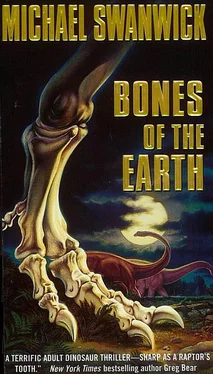As a result, Leyster had had to train his memory so he could compose their scientific papers in his head, recite them to the tribe to get their feedback, and then, only when all objections had been dealt with, transcribe the words in his tiniest, neatest hand.
“What’s the title?” Tamara asked. Daljit and Jamal sat up to hear.
He told them.
“Not very catchy, is it?” Jamal said.
“It’s not supposed to be catchy. It’s supposed to convey information in as clear and specific a fashion as possible.”
“Yeah, but…”
“Oh, Jamal just wants it to be commercial,” Daljit said. “So he can license the gaming rights and market a set of plastic action figures to Burger King.”
Jamal flushed. “I withdraw my objection.”
She gave him a squeeze. “I’m just teasing you, sweetie-pie. I know you’re not like that anymore.” Then, as an afterthought, she said to Leyster, “You’re not going to include Chuck’s goofball notion, are you?”
“I might.”
“Refresh my memory,” Jamal said. “Exactly what was his theory again?”
“To begin with, he posited that since the major dinosaurs are capable of hearing infrasound, they would also be able to hear the mountains shifting and the continents moving underfoot. That movement is so slight and regular that they could then orient themselves by it. It would provide a sonic compass for their migrations—they’d simply head toward where the world sounded right to them.
“Now, when the Chicxulub impactor struck the Earth, it would have set up reverberations that lasted for years. That’s elementary. Major earthquakes do that all the time.
“But Chuck speculated that, since the impact was so much greater than any earthquake, dinosaurs would then be deafened to the steady noises that tell them where they are. They wouldn’t know where to go for the migrations. He further speculated that the noise might be great enough that they would no longer be able to communicate. Thus rendering their feeding strategies useless.
“Their very strengths would then be turned against themselves. Over adapted as they are, they could not survive the difficult times after the disaster. Less specialized taxons like crocodiles and birds manage to survive into the new era simply because they are less specialized. They could adapt, where non-avian dinosaurs could not.”
Jamal shook his head. “Chuck was a sweet guy, but his theory is full of it.”
“It is not!” Tamara said. “What’s wrong with it?”
“It’s not falsifiable, to begin with. There’s no way you can test it.”
“That’s not—”
Leyster turned away from the others and returned his attention to the mountainous forests gliding by. The voices faded to a background murmur in his mind. Ahead, a grandfatherly old tanglewood tree stretched arthritic limbs out over the water. As they passed it, tree-divers—crocs no larger than his hand, with iridescent membranes stretched between their front and hind feet—rained down into the river. They launched themselves from the limbs, glided downbank in twisty aerial paths, and plunged into the water with a soft noise.
Plop. Plop. Ploplop. Plop. Ploploploploplop. Plop.
It was a rich world, filled with fascinating creatures he would never have time enough even to begin to study. Leyster sighed, and let his mind wander freely over the data they had gathered so far.
The central fact of their discovery came first. They had observed and then confirmed by instrumentation that several different species of dinosaur “spoke” to each other by means of infrasound. Rather than enumerate all the species they had documented as communicating in this manner, he synopsised them as “several major dinosaur groups.” The species involved could be mentioned when he came to specific interactions, and this way was more concise.
The dirty little secret of scientific journals was that not only did they not pay for the papers they printed, the authors had to pay them a fixed rate of so much per page. Not that money alone could get you into a serious journal; you still had to write a paper that would get past peer review and impress the editors enough to want it. But, particularly if you were just starting out, you might delay publication of some papers for years, while waiting for your financial situation to clear up.
The system, for all its faults, did have one positive effect, though: It kept the papers terse. The irony was that now, when the economics of scientific journals was irrelevant, the limits of his ability to memorize text imposed an equally strict need for economy.
* * *
When he was satisfied with the wording, he announced that he’d come up with the first section of the paper, and recited it aloud. The others abandoned their argument to consider it.
“That should be ‘field observations’ rather than ‘observations in the field,’ ” Daljit said. “It’s shorter.”
“Good thought. I’ll change it.”
“Why ‘major dinosaur groups?’ ” Jamal asked. “Why not simply ‘dinosaurs?’ ”
“Because we don’t know that all dinosaurs engage in the behavior. In fact, we’re pretty certain that some—birds—don’t.”
“Point taken.”
The phone rang.
“Yes?” Tamara said. “It’s Gillian,” she told them. Then, to Gillian, “Leyster’s working on the paper. Yes, already. Well, obviously he thought we had enough data. What? No! Well, it’s about time. Hey, everybody! Lai-tsz’s gone into labor!”
“She has?”
“You’re kidding me.”
“Outstanding!”
“They’re all happy and everybody sends their love. When did it start? Uh-huh. How’s she doing? Well, of course.” She was silent for a bit, then said, “Okay, I’ll ask him.”
She turned to Leyster. “Gillian wants to know if you’re going to use Chuck’s theory.”
The raft lurched. “Oh, cripes!” Daljit said. “Who’s navigating?”
* * *
It took them over an hour to get the raft off the sand bar, and it was dirty and difficult work doing so. They all had to climb into the water (except Jamal, who stayed aboard and fretted) so the raft would ride higher in the water, and then wrangle it over toward deeper water.
Dirty and tired, and yet exhilarated by their eventual success, they shucked off their clothes and spread them out to dry. Daljit bullied them into raising poles at the rear and lashing a canvas to them to make a canopy to keep from getting sunburned.
They were amiably finishing up their comments on the opening of the paper—it was the simplest part, and there was the least room for disagreements of interpretation—when Tamara suddenly held a hand up and said, “Shhh!”
“What is it?” Leyster whispered.
She pointed to the left bank. A Stygivenator molari was walking briskly downriver along its margin, moving at a speed that kept it parallel to them. Every now and then it would glance over at them, its eyes bright and avaricious.
Leyster shivered involuntarily. A stygivenator was one of the larger predators, as large as a juvenile tyrannosaur but with the reflexes of an adult predator.
“What’s it doing?” Jamal asked quietly.
“Pacing us,” Leyster whispered back. Fortunately, most theropods were lousy swimmers.
“So what should we do about that?”
“Keep quiet, and be very careful not to let the raft drift too close to it.”
Then the river bent, and they all had to frantically man the poles to keep the raft from running aground. The forest thickened at the bend, and the trees hung far out over the water, forcing the stygivenator inland. By the time they’d regained the center of the river, it was gone.
There were termite mounds on the right-hand side of the Eden—a metropolis of them. On the left, Leyster saw a marsh hopper prying open a freshwater clam with its tiny claws and furred paws. Suddenly a troodon that neither Leyster nor the marsh hopper had suspected was lurking there, snapped up the small mammal. It shook its head twice to snap the marsh hopper’s spine, then lifted its neck and swallowed down the unfortunate animal whole.
Читать дальше






